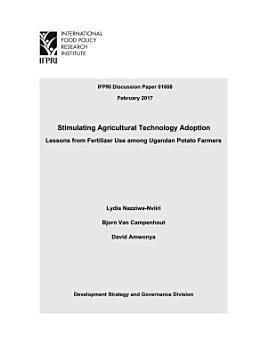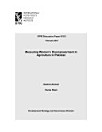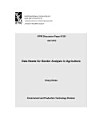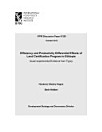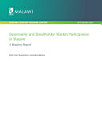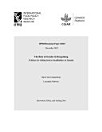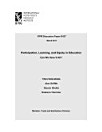Stimulating agricultural technology adoption: Lessons from fertilizer use among Ugandan potato farmers
Nazziwa-Nviiri, Lydia · Van Campenhout, Bjorn · Amwonya, David
Feb 2017 · IFPRI Discussion Paper Book 1 · Intl Food Policy Res Inst
Ebook
36
Pages
family_home
Eligible
info
reportRatings and reviews aren’t verified Learn More
About this ebook
In the context of a growing population in an already densely populated area, agricultural yields will need to increase without putting additional stress on the environment. The adoption of modern inputs by smallholders is an important ingredient of agricultural transformation. In this study we explore plot-level, household-level, and institutional-level characteristics associated with agricultural technology adoption behavior among smallholder farmers. The aim is to uncover correlations that can guide the design of policies and incentives that are likely to increase adoption. We explicitly differentiate between fixed costs that are likely to affect the decision to use the technology and variable costs that are more relevant for the decision regarding use intensity. In addition, we examine how the importance of each of these characteristics differs with asset status. To do so, we use data from about 1,880 potato plots cultivated by 500 randomly selected potato growers in southwestern Uganda. We first categorize households into poorly endowed and well-endowed asset classes based on their access to productive assets. We then estimate double-hurdle models for take-up and use intensity of fertilizer for each group. The results show that the factors associated with the decision to use fertilizer are often different from those associated with the decision about how much fertilizer to use and that the characteristics correlated with fertilizer adoption differ between asset-poor and asset-rich farmers. For instance, asset-poor female-headed households are less likely to use fertilizer, but if they do, they use more of it than male-headed households. Our results also suggest fertilizer packaging and distribution are important factors in fertilizer adoption decisions due to their impact on costs related to both indivisibilities and uncertainty about the quality. We derive a range of policy recommendations.
Rate this ebook
Tell us what you think.
Reading information
Smartphones and tablets
Install the Google Play Books app for Android and iPad/iPhone. It syncs automatically with your account and allows you to read online or offline wherever you are.
Laptops and computers
You can listen to audiobooks purchased on Google Play using your computer's web browser.
eReaders and other devices
To read on e-ink devices like Kobo eReaders, you'll need to download a file and transfer it to your device. Follow the detailed Help Center instructions to transfer the files to supported eReaders.
